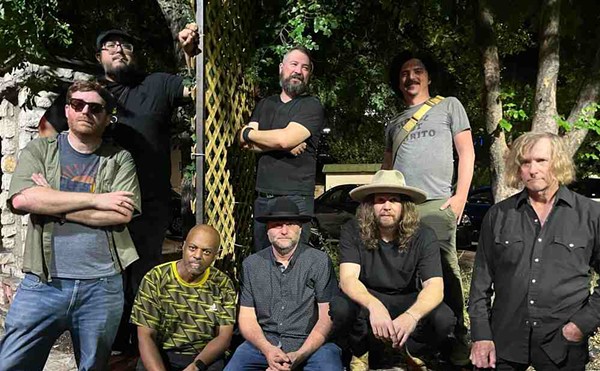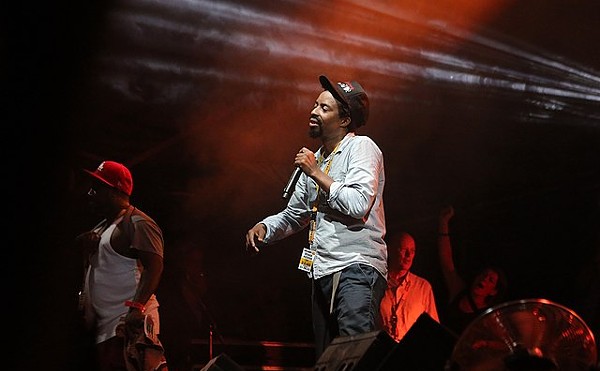On May 17, and as part of Queen’s 40th anniversary, Hollywood Records reissued the band’s entire 15-disc catalogue. Along with a remastering from the original source material by legendary American engineer Bob Ludwig, a bonus disc with bootlegs, rarities, and live tracks aplenty is included with each album to keep diehard fans salivating.
While original producer Roy Thomas Baker was not involved in the project, guitarist Brian May and drummer Roger Taylor were. After extensive repeated listens to both original and remastered versions (I now dream in rich vocal harmonies), I’ve come to some conclusions.
***1/2
Queen
Before the sold-out arenas, before the number one hits, before anyone had stopped to wonder at Mercury’s excessive use of words like “dahling,” there was a promising debut album from an unknown English rock band trying to make it big. In retrospect, the album is not the band’s finest moment. The big ideas that would later grow into trademark Queen are in the working stages, and what comes through is an oftentimes jerky display of potential.
The disc opens with “Keep Yourself Alive,” the fist-pumping first single that may actually be the strongest track on the album. Brian May’s lovingly dubbed “Red Special” is given first utterance, and the multi-tracked guitar lines are a fitting introduction to a sound that would become as quintessentially Queen as the group’s vocal harmonies and Freddie Mercury’s arresting voice. However, the band’s stylistic experimentation provides for some floundering, as “Doing All Right” brings the energy down into dull, sunny ’70s pop land, comparable to a Carpenters’ B-side, perhaps, proving a disappointing lead into some of Mercury’s most underrated material.
The next three tracks, probably largely unknown by many self-proclaimed Queen fans, are telling precursors to what the band was capable of. “Great King Rat,” “My Fairy King,” and “Liar” are all impressive in their own right and have the musicality and ferocious instrumentation that validates lyrics about dirty old men dying of syphilis and lands where horses are “born with eagle wings” and “honey bees have lost their stings.” The latter, in particular, is one of the first examples of a penchant for flawlessly weaving theatrical operatics into rock accessibility, as the harmonized chants of “liar” recall a Greek Chorus piercing through Mercury’s soaring vocal range. With the remastering, the band’s self-proclaimed effort to create a sense of immediacy with the record finally becomes fully realized. May’s searing guitar lines weave in and out of the speakers with a three dimensionality that could only be hinted at in the original release.
The band tries their hand at a few other tricks, and the sludgy “Son and Daughter” is a forgettable foray into Black Sabbath territory.
The bonus demos are frequently more worthwhile, offering interesting twists on a few of the stronger tunes. The “Liar” demo has merit if solely for the fact that it reveals just how bad some of these tracks could have been. The vocals are disconcertingly weak when compared to the album that ultimately developed.
Weak moments aside, Queen’s eponymous debut is an impressive feat from a band whose record-crushing and outrageously garb are not too far off.
****
Queen II
While it may come as a shock to today’s whippersnappers (what with their digital music and XM Radio), there actually was a time you could physically hold music in your hands. Queen took advantage of this marvel of yesteryear in their second release, allotting Brian May a “white” side and Mercury a “black” on which to hone their respective chops. Retaining the debut’s diversity, this second release sees the band getting a step closer to realizing its bombastic nature. As far as individual components go, May’s side does, however, hold a bit more variety. The grandiose instrumental “Procession” leads into hard-rock epic “Father to Son” before moving from ballad to folk-pop to Roger Taylor’s own (and very out of place) bluesy rocker “The Loser in the End.”
Hearing drum and bass with as much vigor and clarity as May’s guitar (especially in “Father to Son”) is enough validation for the remaster as any. The volume here hasn’t just been kicked up a few notches like so many recent reissues, but real attention has been paid to individualizing each respective part to phenomenal results.
But while the “white” side was busy proving the band’s diversity, Mercury’s “black” side was dedicated to assuring whoever might be listening (at that point, not too many) that Queen’s flair for the dramatic was going to go unparalleled. No better outlet for this existed at the time than the intricate and esoteric sensibilities of prog-rock, so Freddie went for it and didn’t hold back.
While he seems to have eventually purged himself of the fantastical lyricism that plagues the second half of the record — no later releases hold lyrics that quite match “The ogre men are coming out/from the two-way mirror mountain” — as far as musical theatricality goes, Mercury’s just beginning to stretch. Screeching vocals surround May’s blistering technical prowess in “Ogre Battle” and “The Fairy Feller’s Master-Stroke” offers a nightmarish interlude of ghoulish harmonics and manic, layered guitars.
Yet, when compared to “The March of the Black Queen” (a precursor to “Bohemian Rhapsody”), it’s all child’s play (although any child at play this way might be deemed not only precocious but mentally ill). Key and style are constantly on the shift, forging an epic example of Mercury’s songwriting craft.
Some of the bonus tracks have been released before, and while they can be fun, it is the live tracks included that reveal the band’s early showmanship. The real kicker is sound quality, and this 20-odd-minute bonus disc is nothing to complain about.
*****
Sheer Heart Attack
Queen’s aptly named third album opens into a literal festival of sound with “Brighton Rock,” an apt setting for the album’s ultimate goal of bringing the show to the masses. As soon as the theatrics threaten to deconstruct into a carnival-esque nightmare, May breaks through with the pummeling riffs that stabilize Freddie Mercury’s verging-on-hysteria falsetto. When we’re talking Queen, though, outrageous is just the status quo.
Given the nature of their myriad styles, Mercury and Co. are able to fit into a few more markets than most other bands of the time, especially with this album. Queen, however, swims in murkier waters. The whimsical imagery has been toned back a bit, but Sheer Heart Attack isn’t without the frenzied riffs and searing prog-roots solos. “Glamour is part of us, and we want to be dandy,” says Mercury, but “Stone Cold Crazy” was channeling thrash before the future members of Metallica — who would eventually cover the song — had even been alive long enough to start hating the world, much less each other.
For a record that is never quite this and never fully that, Sheer Heart Attack doesn’t fall into the disjointed traps that have snared other bands attempting to realize mammoth visions. Queen wanted this album to be a bit simpler and more accessible, qualities that probably held a different meaning for Mercury than for the rest of the world. Still, their assault on the singles chart was fruitful (think “Killer Queen”), and that fruit entered the world as an iron-codpiece-clad vaudevillian belting harmonic love-melodies with operetta sensibilities.
The remastering sounds fantastic, with each layer given the emphasis it deserved. Even the bonus tracks, nothing totally new, are fun to have. The mostly a capella version of “Bring Back That Leroy Brown” proves that the boys are just as talented and able stripped down as they are in layered vocals and lycra bodysuits (the latter perhaps more so in Mercury’s case), and the live version of “Now I’m Here” gives a glimpse into the theatricality that was Queen in its early heyday.
Inarguably one of the band’s best albums, Sheer Heart Attack might be an ideal introduction for anyone unfamiliar with this sect of rock royalty, potential for cardiac arrest be damned.
****1/2
A Night At The Opera
At the time of its release, A Night At The Opera was considered the most expensive rock album ever made. “Bohemian Rhapsody” alone made use of 180 vocal overdubs, five separate studios, and a three-week recording period.
But if Sheer Heart Attack was Queen’s introduction to the public’s approval, this record was their assertion that they had no intention of leaving this new realm anytime soon. And each member was given an opportunity to express their individual strengths and passions.
Freddie, for one, got to fully realize his flair for vaudevillian theatricality with tracks like “Lazing on a Sunday Afternoon” and, of course, the magnum opus that is “Bohemian Rhapsody.” Roger Taylor was allowed to show off his penchant for rocker sensibilities and a borderline inappropriate relationship with his car. Even John Deacon gets a writing credit for the incredibly successful pop addition, “You’re My Best Friend.”
And it’s in Opera that the band as a whole holds absolutely nothing back, tackling every indulgence and whim with a ferocity and, more importantly, a self-awareness that saves them from the absurd. Is it over the top? Without question. Does it border on ridiculous? Not entirely. The boys clearly approach what they’re doing with a sense of humor and light-heartedness that saves them from such potential pitfalls. For instance, “Seaside Rendezvous” famously has Taylor and Mercury imitating a variety of brass and woodwind instruments with nothing but their own vocal abilities to an effect as impressive as it is delightful.
May gets to imitate some sounds himself in “Good Company,” although his instrument of choice is his own Red Special guitar, manipulated to the point of producing the sound of a full Dixieland jazz backup band — trumpets, trombones, and all.
This particular set of bonus tracks seemed to be scraping the barrel a bit. We’re offered a version of “Keep Yourself Alive” that doesn’t vary all too much from the original that came two albums prior, and while the a capella section from “Bohemian Rhapsody” is fun, a “You’re My Best Friend” backing track makes for an uncomfortable listen outside karaoke settings. The live tracks are, again, a bit more worthwhile, but it remains something of a disappointment that this is what we get for one of Queen’s most acclaimed and successful albums.
****1/2
A Day At The Races
It’s a daunting feat to attempt to come back from something as flawlessly extravagant as A Night At The Opera, so its not surprising that Queen’s attempt with A Day At The Races doesn’t quite succeed in attaining the accolades and grandeur of vision that came with its predecessor. And that’s not for any lack of trying. The cover art clearly sets up the two to be twins of sorts, and both titles get their origins from Marx Brothers films. Technique, style, and execution are all there, but what’s missing is the progression and growth that came with the earlier records.
Part of the excitement of early Queen albums is the clear path of experimentation and growth that led them to become inimitable rock gods. While Races certainly doesn’t see the band resting on their laurels, they do seem to be holding onto the same methods they know produce positive results. But that’s not necessarily a bad thing.
By any standard (of those non-deaf or with a modicum of musical taste, but no judgments here), A Day At The Races is a phenomenal record. The band is at the top of its game, and the only track bordering on weak might be “White Man,” a decent effort by May that, nevertheless, doesn’t quite match up to the rest of the album in lyrics or execution.
However, these weak points are rare. The breathy ballad “You Take My Breath Away” remains one of the band’s must underrated, with Freddie’s overdubbed vocals employed to absolutely stunning effect.
While no one’s going to accuse “Somebody To Love” of being underrated, the reissue allows May’s solo to come through with piercing clarity and Deacon’s baseline finds the voice that the song deserves.
As the band’s first entirely self-produced record (they kept engineer Mike Stone from the previous albums), their ability to create something to rival their previous masterpiece is impressive. While it may not have made quite the same splash as A Night At The Opera, musically it might be argued it is just as strong; the unfortunate fact that it had to come second to Opera is all that really tarnishes its cred in the Queen discography.
A generous handful of live tracks (including a version of “Good Old-Fashioned Lover Boy” recorded at the BBC’s Top of the Pops TV show in 1977) fill out the bonus CD of this final record in the first batch of reissues. All in all, an impressive close to a disc that, when not looked at in the shadow of its predecessor, is as strong as any the band could hope to produce.
















